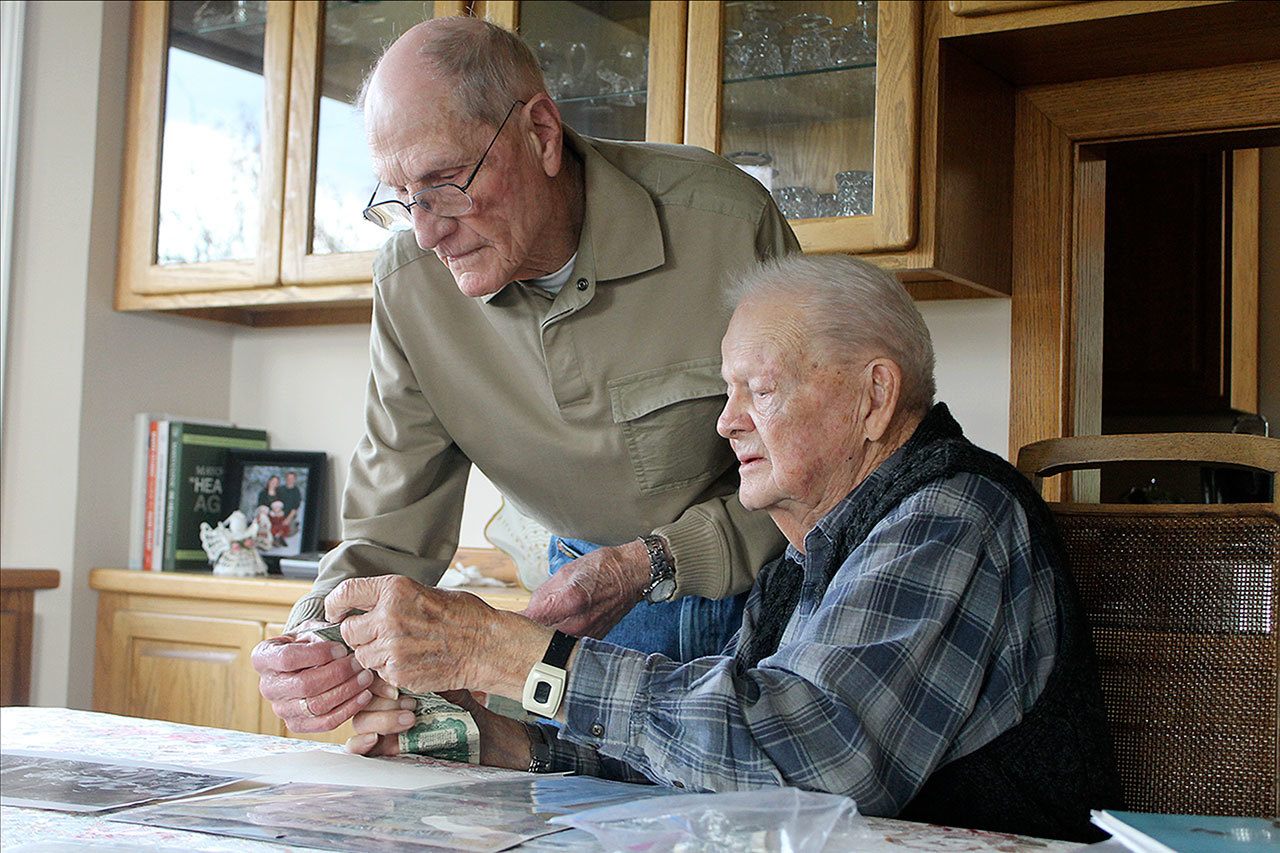It was a common sacrifice that connects World War II veterans Merle “Milo” Milfs of Langley and Freeland resident George Clark.
Each gave up a significant chunk of their young adult lives to defend the freedom of the United States as it fought a two-front war against the Axis and Imperial powers in the early to mid-1940s. What they got in return, they said, was the pride of knowing their cause was ultimately just.
Like many others, Milfs joined the Navy after Pearl Harbor was bombed by the Japanese on Dec. 7, 1941, while Clark served in the U.S. Army Air Corps (later transformed into the Air Force) from 1939 to 1945.
“It took a big hunk out of my life as a young, married man,” Clark said.
The pair meet on a monthly basis at the Masonic Lodge in Langley and share stories and experiences. Even during a gathering Monday morning at Clark’s home in Freeland, there were new tales to share.
Among other things, they talked about Dec. 7, a day that transformed both the course of U.S. history and the two men’s lives, and the unity they felt with their fellow comrades. Clark also said he’s unsettled with the state of the country.
“Frankly speaking, I’m so deeply concerned with the direction our nation is going right now,” Clark said. “Lack of choice in presidencies, and I never really thought I’d be so worried about a country as I am now.”
Milfs and Clark also shared some insights of mortality. Both felt they were spared the fate of many of their friends and countrymen who died in the war, as they were away from fighting on the ground. The memories of the dead won’t be far from their minds on Veterans Day, Nov. 11.
“Almost every time, I think about my buddies,” Milfs said. “Some of them were killed.”
Milfs, 95, commanded LCT-1037, an amphibious assault craft used to land tanks on beachheads.
His proudest experiences came when he took part in General Douglas MacArthur’s landing force in the Philippines to help liberate American civilians and servicemen from prisoner of war camps.
Among the people rescued was his former high school teacher from his hometown of Le Mars, Iowa, who was being held at Santo Tomas Internment Camp after her husband was killed by the Japanese. Though he never had a chance to see her after her rescue, Milfs was happy to know MacArthur’s force helped bring her and others home.
“That was very satisfying,” Milfs said.
It wasn’t always so.
Milfs saw his hometown friend Bill Ullum lose a leg after being struck with shrapnel from an enemy mortar round. Ullum was taken to a hospital ship to recover from his wounds, but it was later bombed by the Japanese.
Milfs thought he was dead. That was until a chance encounter while both were attending the University of Southern California reconnected them. Milfs happened to be walking around the campus when he saw a man limping, who he later recognized as his friend, Ullum.
“We spent the rest of the night talking to each other,” Milfs said. “That was a pretty touching experience.”
Before going overseas, Clark flew radio-controlled aircraft which served as the forerunners of the drone aircraft that are used heavily in today’s modern warfare.
He eventually made his way to the Pacific Theater and flew combat missions with the Thirteenth Air Force, which later earned the nickname “Jungle Air Force.”
Clark remembered when a U.S. airplane in Clark’s unit was forced to make a crash landing into the ocean after it had run out of fuel. Clark’s crew and plane volunteered for a search-and-rescue mission, but after seven days they were forced to abandon it. Clark said he and his crew members had the grim task of gathering the lost crew’s belongings to send home. Seeing pictures of their girlfriends and wives made the task even harder.
Then they heard some commotion at the far end of their camp. It was the crew of the downed aircraft.
Clark said they had made a successful landing in the water, gone ashore with life crafts and encountered a heavily populated Japanese fortification, then went back out to sea and spent the next week on the water before signaling a U.S. aircraft.
“We had a wonderful celebration with those guys,” Clark said. “Talk about a love for man. It’s hard for people to realize.”
Clark’s perplexity over why he survived and others did not still lingers.
While visiting Arlington National Cemetery in Washington D.C. with some family members in 2010, Clark found a bench to sit on and told his relatives that he would catch up with them later. In front of him lay a sea with thousands of headstones, the dead of the nation’s conflicts including World War II.
He asked himself a simple question.
“Why them and not me?”


